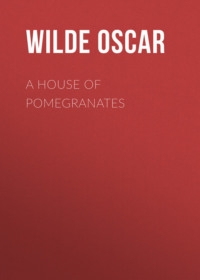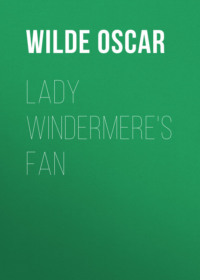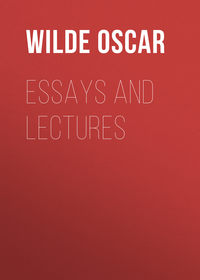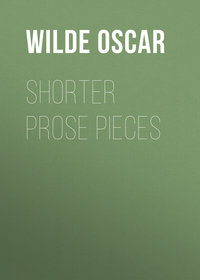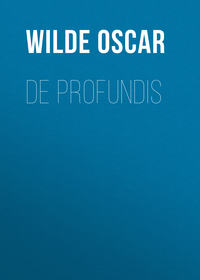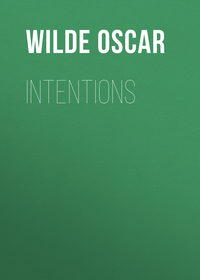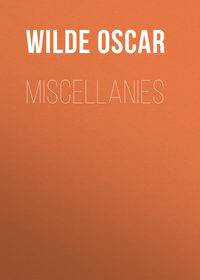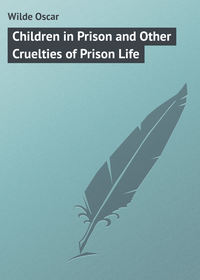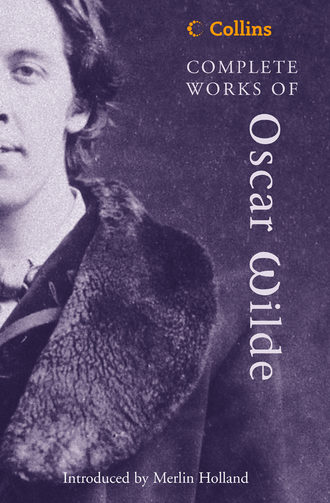
Полная версия
Complete Works of Oscar Wilde
‘It is true, and I would that I had not told thee of it,’ she cried, and she clung to his knees weeping.
He put her from him and left her in the rank grass, and going to the edge of the mountain he placed the knife in his belt and began to climb down.
And his Soul that was within him called out to him and said, ‘Lo! I have dwelt with thee for all these years, and have been thy servant. Send me not away from thee now, for what evil have I done thee?’
And the young Fisherman laughed. ‘Thou hast done me no evil, but I have no need of thee,’ he answered. ‘The world is wide, and there is Heaven also, and Hell, and that dim twilight house that lies between. Go wherever thou wilt, but trouble me not, for my love is calling to me.’
And his Soul besought him piteously, but he heeded it not, but leapt from crag to crag, being surefooted as a wild goat, and at last he reached the level ground and the yellow shore of the sea.
Bronze-limbed and well-knit, like a statue wrought by a Grecian, he stood on the sand with his back to the moon, and out of the foam came white arms that beckoned to him, and out of the waves rose dim forms that did him homage. Before him lay his shadow, which was the body of his Soul, and behind him hung the moon in the honey-coloured air.
And his Soul said to him, ‘If indeed thou must drive me from thee, send me not forth without a heart. The world is cruel, give me thy heart to take with me.’
He tossed his head and smiled. ‘With what should I love my love if I gave thee my heart?’ he cried.
‘Nay, but be merciful,’ said his Soul: ‘give me thy heart, for the world is very cruel, and I am afraid.’
‘My heart is my love’s,’ he answered, ‘therefore tarry not, but get thee gone.’
‘Should I not love also?’ asked his Soul.
‘Get thee gone, for I have no need of thee,’ cried the young Fisherman, and he took the little knife with its handle of green viper’s skin, and cut away his shadow from around his feet, and it rose up and stood before him, and looked at him, and it was even as himself.
He crept back, and thrust the knife into his belt, and a feeling of awe came over him. ‘Get thee gone,’ he murmured, ‘and let me see thy face no more.’
‘Nay, but we must meet again,’ said the Soul. Its voice was low and flutelike, and its lips hardly moved while it spake.
‘How shall me meet?’ cried the young Fisherman. ‘Thou wilt not follow me into the depths of the sea?’
‘Once every year I will come to this place, and call to thee,’ said the Soul. ‘It may be that thou wilt have need of me.’
‘What need should I have of thee?’ cried the young Fisherman, ‘but be it as thou wilt,’ and he plunged into the water, and the Tritons blew their horns, and the little Mermaid rose up to meet him, and put her arms around his neck and kissed him on the mouth.
And the Soul stood on the lonely beach and watched them. And when they had sunk down into the sea, it went weeping away over the marshes.
And after a year was over the Soul came down to the shore of the sea and called to the young Fisherman, and he rose out of the deep, and said, ‘Why dost thou call to me?’
And the Soul answered, ‘Come nearer, that I may speak with thee, for I have seen marvellous things.’
So he came nearer, and couched in the shallow water, and leaned his head upon his hand and listened.
And the Soul said to him, ‘When I left thee I turned my face to the East and journeyed. From the East cometh everything that is wise. Six days I journeyed, and on the morning of the seventh day I came to a hill that is in the country of the Tartars. I sat down under the shade of a tamarisk tree to shelter myself from the sun. The land was dry and burnt up with the heat. The people went to and fro over the plain like flies crawling upon a disk of polished copper.
‘When it was noon a cloud of red dust rose up from the flat rim of the land. When the Tartars saw it, they strung their painted bows, and having leapt upon their little horses they galloped to meet it. The women fled screaming to the waggons, and hid themselves behind the felt curtains.
‘At twilight the Tartars returned, but five of them were missing, and of those that came back not a few had been wounded. They harnessed their horses to the waggons and drove hastily away. Three jackals came out of a cave and peered after them. Then they sniffed up the air with their nostrils, and trotted off in the opposite direction.
‘When the moon rose I saw a camp-fire burning on the plain, and went towards it. A company of merchants were seated round it on carpets. Their camels were picketed behind them, and the negroes who were their servants were pitching tents of tanned skin upon the sand, and making a high wall of the prickly pear.
‘As I came near them, the chief of the merchants rose up and drew his sword and asked me my business.
‘I answered that I was a Prince in my own land, and that I had escaped from the Tartars, who had sought to make me their slave. The chief smiled, and showed me five heads fixed upon long reeds of bamboo.
‘Then he asked me who was the prophet of God, and I answered him Mohammed.
‘When he heard the name of the false prophet, he bowed and took me by the hand, and placed me by his side. A negro brought me some mare’s milk in a wooden dish, and a piece of lamb’s flesh roasted.
‘At daybreak we started on our journey. I rode on a red-haired camel by the side of the chief, and a runner ran before us carrying a spear. The men of war were on either hand, and the mules followed with the merchandise. There were forty camels in the caravan, and the mules were twice forty in number.
‘We went from the country of the Tartars into the country of those who curse the Moon. We saw the Gryphons guarding their gold on the white rocks, and the scaled Dragons sleeping in their caves. As we passed over the mountains we held our breath lest the snows might fall on us, and each man tied a veil of gauze before his eyes. As we passed through the valleys the Pygmies shot arrows at us from the hollows of the trees, and at night-time we heard the wild men beating on their drums. When we came to the Tower of Apes we set fruits before them, and they did not harm us. When we came to the Tower of Serpents we gave them warm milk in bowls of brass, and they let us go by. Three times in our journey we came to the banks of the Oxus. We crossed it on rafts of wood with great bladders of blown hide. The river-horses raged against us and sought to slay us. When the camels saw them they trembled.
‘The kings of each city levied tolls on us, but would not suffer us to enter their gates. They threw us bread over the walls, little maizecakes baked in honey and cakes of fine flour filled with dates. For every hundred baskets we gave them a bead of amber.
‘When the dwellers in the villages saw us coming, they poisoned the wells and fled to the hill-summits. We fought with the Magadae who are born old, and grow younger and younger every year, and die when they are little children; and with the Laktroi who say that they are the sons of tigers, and paint themselves yellow and black; and with the Aurantes who bury their dead on the tops of trees, and themselves live in dark caverns lest the Sun, who is their god, should slay them; and with the Krimnians who worship a crocodile, and give it ear-rings of green grass, and feed it with butter and fresh fowls; and with the Agazonbae, who are dog-faced; and with the Sibans, who have horses’ feet, and run more swiftly than horses. A third of our company died in battle, and a third died of want. The rest murmured against me, and said that I had brought them an evil fortune. I took a horned adder from beneath a stone and let it sting me. When they saw that I did not sicken they grew afraid.
‘In the fourth month we reached the city of Illel. It was night-time when we came to the grove that is outside the walls, and the air was sultry, for the Moon was travelling in Scorpion. We took the ripe pomegranates from the trees, and brake them, and drank their sweet juices. Then we lay down on our carpets and waited for the dawn.
‘And at dawn we rose and knocked at the gate of the city. It was wrought out of red bronze, and carved with sea-dragons and dragons that have wings. The guards looked down from the battlements and asked us our business. The interpreter of the caravan answered that we had come from the island of Syria with much merchandise. They took hostages, and told us that they would open the gate to us at noon, and bade us tarry till then.
‘When it was noon they opened the gate, and as we entered in the people came crowding out of the houses to look at us, and a crier went round the city crying through a shell. We stood in the market-place, and the negroes uncorded the bales of figured cloths and opened the carved chests of sycamore. And when they had ended their task, the merchants set forth their strange wares, the waxed linen from Egypt, and the painted linen from the country of the Ethiops, the purple sponges from Tyre and the blue hangings from Sidon, the cups of cold amber and the fine vessels of glass and the curious vessels of burnt clay. From the roof of a house a company of women watched us. One of them wore a mask of gilded leather.
‘And on the first day the priests came and bartered with us, and on the second day came the nobles, and on the third day came the craftsmen and the slaves. And this is their custom with all merchants as long as they tarry in the city.
‘And we tarried for a moon, and when the moon was waning, I wearied and wandered away through the streets of the city and came to the garden of its god. The priests in their yellow robes moved silently through the green trees, and on a pavement of black marble stood the rose-red house in which the god had his dwelling. Its doors were of powdered lacquer, and bulls and peacocks were wrought on them in raised and polished gold. The tilted roof was of sea-green porcelain and the jutting eaves were festooned with little bells. When the white doves flew past, they struck the bells with their wings and made them tinkle.
‘In front of the temple was a pool of clear water paved with veined onyx. I lay down beside it, and with my pale fingers I touched the broad leaves. One of the priests came towards me and stood behind me. He had sandals on his feet, one of soft serpent-skin and the other of birds’ plumage. On his head was a mitre of black felt decorated with silver crescents. Seven yellows were woven into his robe, and his frizzed hair was stained with antimony.
‘And after a little while he spake to me, and asked me my desire.
‘I told him that my desire was to see the god.
‘“The god is hunting,” said the priest, looking strangely at me with his small slanting eyes.
‘“Tell me in what forest, and I will ride with him,” I answered.
‘He combed out the soft fringes of his tunic with his long pointed nails. “The god is asleep,” he murmured.
‘“Tell me on what couch, and I will watch by him,” I answered.
‘“The god is at the feast,” he cried.
‘“If the wine be sweet, I will drink it with him, and if it be bitter I will drink it with him also,” was my answer.
‘He bowed his head in wonder, and, taking me by the hand, he raised me up, and led me into the temple.
‘And in the first chamber I saw an idol seated on a throne of jasper bordered with great orient pearls. It was carved out of ebony, and in stature was of the stature of a man. On its forehead was a ruby, and thick oil dripped from its hair on to its thighs. Its feet were red with the blood of a newly-slain kid, and its loins girt with a copper belt that was studded with seven beryls.
‘And I said to the priest, “Is this the god?” And he answered me, “This is the god.”
‘“Show me the god,” I cried, “or I will surely slay thee.” And I touched his hand, and it became withered.
‘And the priest besought me, saying, “Let my lord heal his servant, and I will show him the god.”
‘So I breathed with my breath upon his hand, and it became whole again, and he trembled and led me into the second chamber, and I saw an idol standing on a lotus of jade hung with great emeralds. It was carved out of ivory, and in stature was twice the stature of a man. On its forehead was a chrysolite, and its breasts were smeared with myrrh and cinnamon. In one hand it held a crooked sceptre of jade, and in the other a round crystal. It wore buskins of brass, and its thick neck was circled with a circle of selenites.
‘And I said to the priest, “Is this the god?” And he answered me, “This is the god.”
‘“Show me the god,” I cried, “or I will surely slay thee.” And I touched his eyes, and they became blind.
‘And the priest besought me, saying, “Let my lord heal his servant, and I will show him the god.”
‘So I breathed with my breath upon his eyes, and the sight came back to them, and he trembled again, and led me into the third chamber, and lo! there was no idol in it, nor image of any kind, but only a mirror of round metal set on an altar of stone.
‘And I said to the priest, “Where is the god?”
‘And he answered me: “There is no god but this mirror that thou seest, for this is the Mirror of Wisdom. And it reflecteth all things that are in heaven and on earth, save only the face of him who looketh into it. This it reflecteth not, so that he who looketh into it may be wise. Many other mirrors are there, but they are mirrors of Opinion. This only is the Mirror of Wisdom. And they who possess this mirror know everything, nor is there anything hidden from them. And they who possess it not have not Wisdom. Therefore is it the god, and we worship it.” And I looked into the mirror, and it was even as he had said to me.
‘And I did a strange thing, but what I did matters not, for in a valley that is but a day’s journey from this place have I hidden the Mirror of Wisdom. Do but suffer me to enter into thee again and be thy servant, and thou shalt be wiser than all the wise men, and Wisdom shall be thine. Suffer me to enter into thee, and none will be as wise as thou.’
But the young Fisherman laughed. ‘Love is better than Wisdom,’ he cried, ‘and the little Mermaid loves me.’
‘Nay, but there is nothing better than Wisdom,’ said the Soul.
‘Love is better,’ answered the young Fisherman, and he plunged into the deep, and the Soul went weeping away over the marshes.
And after the second year was over, the Soul came down to the shore of the sea, and called to the young Fisherman and he rose out of the deep and said, ‘Why dost thou call to me?’
And the Soul answered, ‘Come nearer, that I may speak with thee, for I have seen marvellous things.’
So he came nearer, and couched in the shallow water, and leaned his head upon his hand and listened.
And the Soul said to him, ‘When I left thee, I turned my face to the South and journeyed. From the South cometh everything that is precious. Six days I journeyed along the highways that lead to the city of Ashter, along the dusty red-dyed highways by which the pilgrims are wont to go did I journey, and on the morning of the seventh day I lifted up my eyes, and lo! the city lay at my feet, for it is in a valley.
‘There are nine gates to this city, and in front of each gate stands a bronze horse that neighs when the Bedouins come down from the mountains. The walls are cased with copper, and the watch-towers on the wall are roofed with brass. In every tower stands an archer with a bow in his hand. At sunrise he strikes with an arrow on a gong, and at sunset he blows through a horn of horn.
‘When I sought to enter, the guards stopped me and asked of me who I was. I made answer that I was a Dervish and on my way to the city of Mecca, where there was a green veil on which the Koran was embroidered in silver letters by the hands of the angels. They were filled with wonder, and entreated me to pass in.
‘Inside it is even as a bazaar. Surely thou shouldst have been with me. Across the narrow streets the gay lanterns of paper flutter like large butterflies. When the wind blows over the roofs they rise and fall as painted bubbles do. In front of their booths sit the merchants on silken carpets. They have straight black beards, and their turbans are covered with golden sequins, and long strings of amber and carved peach-stones glide through their cool fingers. Some of them sell galbanum and nard, and curious perfumes from the islands of the Indian Sea, and the thick oil of red roses, and myrrh and little nail-shaped cloves. When one stops to speak to them, they throw pinches of frankincense upon a charcoal brazier and make the air sweet. I saw a Syrian who held in his hands a thin rod like a reed. Grey threads of smoke came from it, and its odour as it burned was as the odour of the pink almond in spring. Others sell silver bracelets embossed all over with creamy blue turquoise stones, and anklets of brass wire fringed with little pearls, and tigers’ claws set in gold, and the claws of that gilt cat, the leopard, set in gold also, and ear-rings of pierced emerald, and finger-rings of hollowed jade. From the tea-houses comes the sound of the guitar, and the opium-smokers with their white smiling faces look out at the passers-by.
‘Of a truth thou shouldst have been with me. The wine-sellers elbow their way through the crowd with great black skins on their shoulders. Most of them sell the wine of Schiraz, which is as sweet as honey. They serve it in little metal cups and strew rose leaves upon it. In the market-place stand the fruitsellers, who sell all kinds of fruit: ripe figs, with their bruised purple flesh, melons, smelling of musk and yellow as topazes, citrons and roseapples and clusters of white grapes, round red-gold oranges, and oval lemons of green gold. Once I saw an elephant go by. Its trunk was painted with vermilion and turmeric, and over its ears it had a net of crimson silk cord. It stopped opposite one of the booths and began eating the oranges, and the man only laughed. Thou canst not think how strange a people they are. When they are glad they go to the bird-sellers and buy of them a caged bird, and set it free that their joy may be greater, and when they are sad they scourge themselves with thorns that their sorrow may not grow less.
‘One evening I met some negroes carrying a heavy palanquin through the bazaar. It was made of gilded bamboo, and the poles were of vermilion lacquer studded with brass peacocks. Across the windows hung thin curtains of muslin embroidered with beetles’ wings and with tiny seed-pearls, and as it passed by a pale-faced Circassian looked out and smiled at me. I followed behind, and the negroes hurried their steps and scowled. But I did not care. I felt a great curiosity come over me.
‘At last they stopped at a square white house. There were no windows to it, only a little door like the door of a tomb. They set down the palanquin and knocked three times with a copper hammer. An Armenian in a caftan of green leather peered through the wicket, and when he saw them he opened, and spread a carpet on the ground, and the woman stepped out. As she went in, she turned round and smiled at me again. I had never seen any one so pale.
‘When the moon rose I returned to the same place and sought for the house, but it was no longer there. When I saw that, I knew who the woman was, and wherefore she had smiled at me.
‘Certainly thou shouldst have been with me. On the feast of the New Moon the young Emperor came forth from his palace and went into the mosque to pray. His hair and beard were dyed with rose-leaves, and his cheeks were powdered with a fine gold dust. The palms of his feet and hands were yellow with saffron.
‘At sunrise he went forth from his palace in a robe of silver, and at sunset he returned to it again in a robe of gold. The people flung themselves on the ground and hid their faces, but I would not do so. I stood by the stall of a seller of dates and waited. When the Emperor saw me, he raised his painted eyebrows and stopped. I stood quite still, and made him no obeisance. The people marvelled at my boldness, and counselled me to flee from the city. I paid no heed to them, but went and sat with the sellers of strange gods, who by reason of their craft are abominated. When I told them what I had done, each of them gave me a god and prayed me to leave them.
‘That night, as I lay on a cushion in the tea-house that is in the Street of Pomegranates, the guards of the Emperor entered and led me to the palace. As I went in they closed each door behind me, and put a chain across it. Inside was a great court with an arcade running all round. The walls were of white alabaster, set here and there with blue and green tiles. The pillars were of green marble, and the pavement of a kind of peach-blossom marble. I had never seen anything like it before.
‘As I passed across the court two veiled women looked down from a balcony and cursed me. The guards hastened on, and the butts of the lances rang upon the polished floor. They opened a gate of wrought ivory, and I found myself in a watered garden of seven terraces. It was planted with tulipcups and moon-flowers, and silver-studded aloes. Like a slim reed of crystal a fountain hung in the dusky air. The cypress-trees were like burnt-out torches. From one of them a nightingale was singing.
‘At the end of the garden stood a little pavilion. As we approached it two eunuchs came out to meet us. Their fat bodies swayed as they walked, and they glanced curiously at me with their yellow-lidded eyes. One of them drew aside the captain of the guard, and in a low voice whispered to him. The other kept munching scented pastilles, which he took with an affected gesture out of an oval box of lilac enamel.
‘After a few moments the captain of the guard dismissed the soldiers. They went back to the palace, the eunuchs following slowly behind and plucking the sweet mulberries from the trees as they passed. Once the elder of the two turned round, and smiled at me with an evil smile.
‘Then the captain of the guard motioned me towards the entrance of the pavilion. I walked on without trembling, and drawing the heavy curtain aside I entered in.
‘The young Emperor was stretched on a couch of dyed lion skins, and a ger-falcon perched upon his wrist. Behind him stood a brass-turbaned Nubian, naked down to the waist, and with heavy ear-rings in his split ears. On a table by the side of the couch lay a mighty scimitar of steel.
‘When the Emperor saw me he frowned, and said to me, “What is thy name? Knowest thou not that I am Emperor of this city?” But I made him no answer.
‘He pointed with his finger at the scimitar, and the Nubian seized it, and rushing forward struck at me with great violence. The blade whizzed through me, and did me no hurt. The man fell sprawling on the floor, and when he rose up his teeth chattered with terror and he hid himself behind the couch.
‘The Emperor leapt to his feet, and taking a lance from a stand of arms, he threw it at me. I caught it in its flight, and brake the shaft into two pieces. He shot at me with an arrow, but I held up my hands and it stopped in mid-air. Then he drew a dagger from a belt of white leather, and stabbed the Nubian in the throat lest the slave should tell of his dishonour. The man writhed like a trampled snake, and a red foam bubbled from his lips.
‘As soon as he was dead the Emperor turned to me, and when he had wiped away the bright sweat from his brow with a little napkin of purfled and purple silk, he said to me, “Art thou a prophet, that I may not harm thee, or the son of a prophet, that I can do thee no hurt? I pray thee leave my city tonight, for while thou art in it I am no longer its lord.”
‘And I answered him, “I will go for half of thy treasure. Give me half of thy treasure, and I will go away.”
‘He took me by the hand, and led me out into the garden. When the captain of the guard saw me, he wondered. When the eunuchs saw me, their knees shook and they fell upon the ground in fear.
‘There is a chamber in the palace that has eight walls of red porphyry, and a brass-scaled ceiling hung with lamps. The Emperor touched one of the walls and it opened, and we passed down a corridor that was lit with many torches. In niches upon each side stood great wine-jars filled to the brim with silver pieces. When we reached the centre of the corridor the Emperor spake the word that may not be spoken, and a granite door swung back on a secret spring, and he put his hands before his face lest his eyes should be dazzled.


